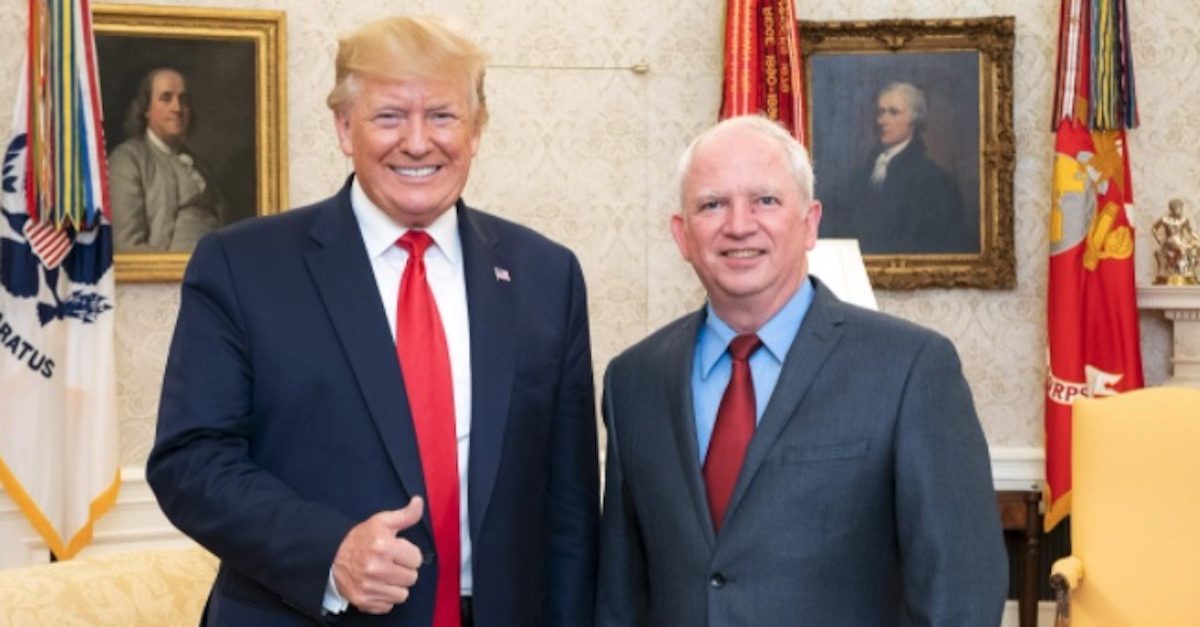
Donald Trump and John Eastman
On the eve of their debut public hearing, the Jan. 6 Committee has been awarded another tranche of 159 documents from the attorney whose six-part plan to block Congress’s certification of Joe Biden’s victory has been branded the “coup memo.”
Late on Tuesday, a federal judge in California overruled attorney John Eastman’s privilege claims on more than a quarter of the 599 files at issue. Eastman must produce them to the committee by 2 p.m. Pacific Time on Wednesday, a little more than a day before the hearing begins.
As in March, U.S. District Judge David O. Carter invoked the crime-fraud exception in his ruling. The judge noted that he previously found that former President Donald Trump and Eastman “likely committed obstruction of an official proceeding […] and conspiracy to defraud the United States.” Neither of the men has been charged with a crime, and the judge’s finding came during a civil dispute.
In the latest ruling, Judge Carter amended the timeline when the alleged plot became “actionable” nearly a month before the attack on the U.S. Capitol.
“The previously disclosed documents indicate that Dr. Eastman and President Trump’s plan to disrupt the Joint Session was fully formed and actionable as early as December 7, 2020,” the ruling states. “On that day, Dr. Eastman forwarded a memo explaining why January 6 was the ‘Hard Deadline’ that was ‘critical to the result of this election’ for the Trump Campaign. A week later, on December 13, President Trump’s personal attorney received a more robust analysis of January 6’s significance, which was potentially ‘the first time members of President Trump’s team transformed a legal interpretation of the Electoral Count Act into a day-by-day plan of action.'”
“The current set of documents also confirm that the plan was established well before January 6, 2021,” it continues. “In an email on December 22, 2020, an attorney with the Trump legal team referred to the ‘the January 6 strategy’ as a known plan to eight other people. Two days later, Dr. Eastman explained that the worst case for the plan was receiving a court decision that constrained Vice President Pence’s authority to reject electors. Dr. Eastman and President Trump’s plan to stop the count was not only established by early December, it was the ultimate goal that the legal team was working to protect from that point forward.”
The judge declined to invoke the crime-fraud exception over four emails discussing possible litigation, reiterating his past findings that “pursuing legal recourse itself did not advance any crimes.”
In a separate email, an unnamed Trump attorney advised avoiding a lawsuit because an adverse court ruling would “tank the January 6 strategy.” Judge Carter found that this crossed the permissible line.
“The Trump legal team chose not to seek recourse in court—instead, they forged ahead with a political campaign to disrupt the electoral count,” the ruling notes. “Lawyers are free not to bring cases; they are not free to evade judicial review to overturn a democratic election.”
The judge also rejected Eastman’s First Amendment objections to a subset of documents involving meetings with a conservative group. Two of their meetings included an agenda titled: “GROUND GAME following Nov 4 Election Results.”
Despite acknowledging that Eastman articulated “legitimate concerns” about his right to associate, Carter found that disclosure of 10 of the documents is “narrowly tailored to the government’s asserted interest.”
Eastman’s attorney Charles Burnham noted that the mixed ruling also cut in his favor on some of the disputed issues, including on certain First Amendment claims.
“The Court upheld Dr. Eastman’s claims of privilege over 440 of the 599 documents at issue,” Burnham wrote in a statement to Law&Crime. “The Court also upheld in part Dr. Eastman’s argument that certain of the materials sought by the January 6th committee were protected by the First Amendment. The decision represents the first time a federal court has held that the January 6th committee’s activities infringe on First Amendment freedoms.”
Burnham also emphasized that the sole instance where the judge applied the crime-fraud exception was under a civil, not a criminal standard. He also claimed that his client addressed “significant evidence of illegality and fraud” in the 2020 election, a proposition rejected unanimously more than 60 times in the courts and over several audits and recounts.
The Jan. 6 Committee did not immediately respond to Law&Crime’s email requesting comment.
Update—June 8 at 1:53 p.m. Eastern Time: This story has been updated to include comment by Eastman’s lawyer.
Read the opinion, below:
(Photo via GiveSendGo)